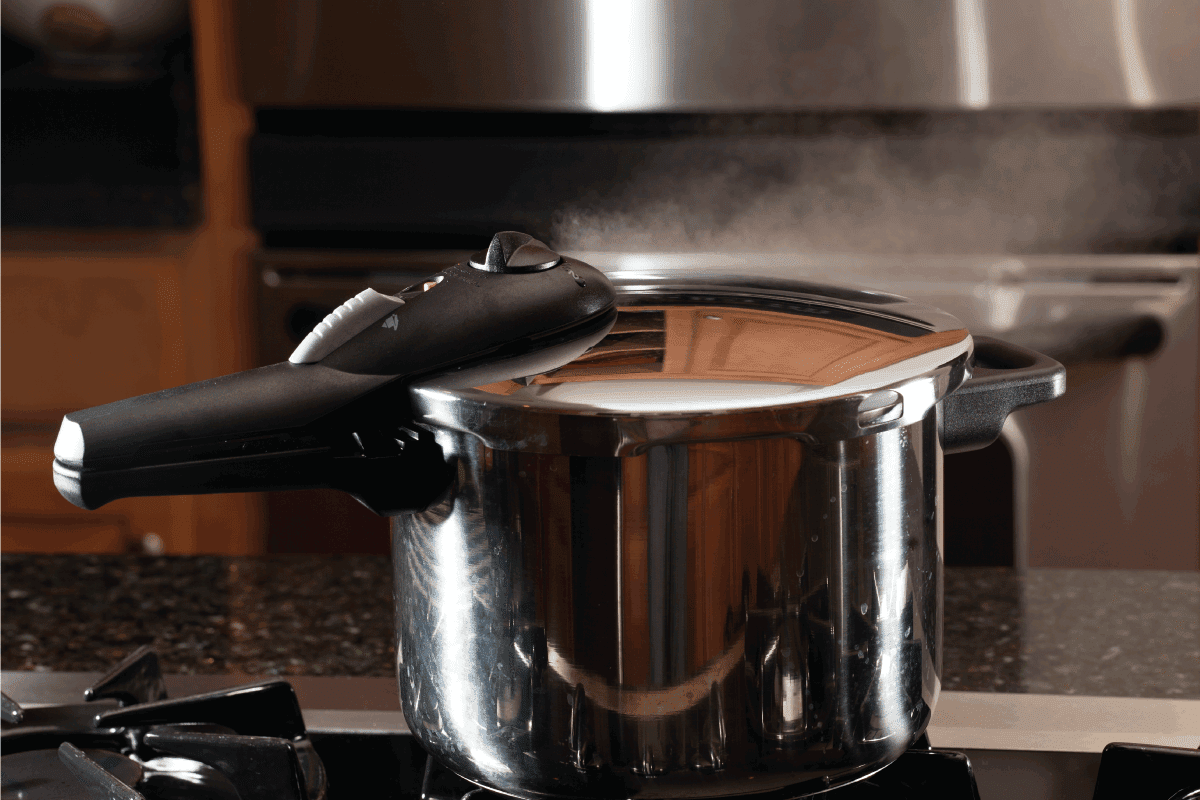It freaks you out a bit to hear hissing coming out of the top of your pressure cooker doesnt it?
This thing is that when heat builds inside a pressure cooker and water starts boiling at extreme temperatures… and you know that the pressure is extremely high the thought of a leak or an escape of steam is scary, like the top is going to pop.
Hissing, for example, can seem unexpected and even indicative of pressure cooker failure when you first hear it. In reality, your pressure cooker is supposed to hiss. The noise indicates the successful release of steam from the cooking unit either at the end of its cook time or when pressure gets too high.

Why Pressure Cookers Hiss and Release Steam Through the Lid
Most people who hear a hissing sound in the kitchen usually associate this sound with a tea kettle. The idea is that the steam gets so hot that it lifts the lid on the kettle that causes it to whistle, which is an easy way to find out that the water is ready.
It is only natural for some to assume that this principle can be applied to a pressure cooker, especially one that is hissing. If steam is releasing or even a little water is coming out of the pressure cooker steam release valve then the pot has come to full pressure and is releasing a small amount of excess pressure. The truth is that the cooker is hissing for the same reason as the tea kettle, but this does not mean that the food in the cooker is done cooking.
A pressure cooker traps steam in the pot to build up heat, which heats up the food quickly. It also controls and minimizes the amount of time the food needs to cook.
The pressure cooker raises the boiling point of water beyond the regular 212 degrees. The spike could go up as high as 250 degrees. The moisture within a pressure cooker also helps some foods like tough meat absorb moisture a lot faster, making the meat tender in a short amount of time. It should be noted that a pressure cooker can also caramelize foods, like vegetables, in no time.
Naturally, the pressure cooker can withstand high pressure cooking without making the cooker hiss, but that does not mean it will not happen.
Pressure Cookers Should Release Steam
The simple fact remains however that pressure cooker lids are designed to release steam to maintain a safe level of pressure. When pressure builds to high safety valves open just enough to release excess pressure which results in a hissing sound and a rattle of the wobbler on the lid.
In most cases electric pressure cookers are the quietest because they can regulate pressure more efficiently but even a little hiss is normal.
Let me explain a little more about pressure release. Stick with me for a second.
Pressure Cooker Noise – Everything You Need to Know
FAQ
Is my pressure cooker supposed to steam while pressurizing?
Is a pressure cooker supposed to whistle?
When should I worry about my pressure cooker?
Why is my pressure cooker releasing?
Why does a pressure cooker make a hissing sound?
The hissing sound from a pressure cooker is normal and expected. While cooking, the pressure inside a pressure cooker reaches around 6 – 15 psi. When the pressure inside builds up to a very high level, safety release valves on the top of the pressure cooker open to release the steam. This lowers the pressure and results in a hissing sound.
Does a pressure cooker Hiss?
Yes, this alerts the cook that there is too much pressure in the pot and that it is releasing the excess pressure. The idea of a hissing pressure cooker may evoke a bit of fear but in many cases certain types of pressure cookers are designed to hiss.
What temperature does a pressure cooker Hiss?
This spike can reach anywhere between 212 degrees Fahrenheit and 250+ degrees Fahrenheit; which is why your pressure cooker may need to release some pressure every once in a while. Should a Pressure Cooker Hiss & Why is My Pressure Cooker Hissing?
What psi does a pressure cooker make?
While cooking, the pressure inside a pressure cooker reaches around 6 – 15 psi. When the pressure inside builds up to a very high level, safety release valves on the top of the pressure cooker open to release the steam. This lowers the pressure and results in a hissing sound. Within safe levels? Table 1.
